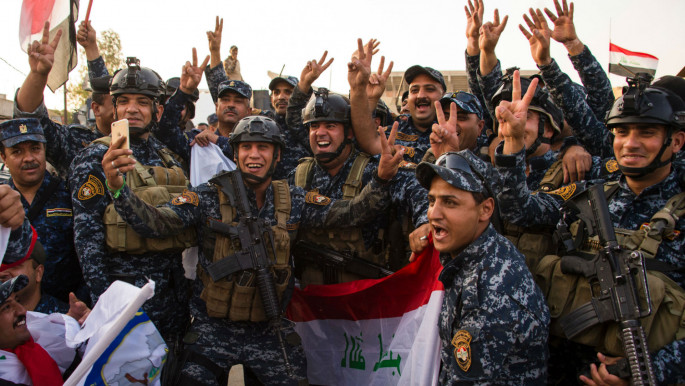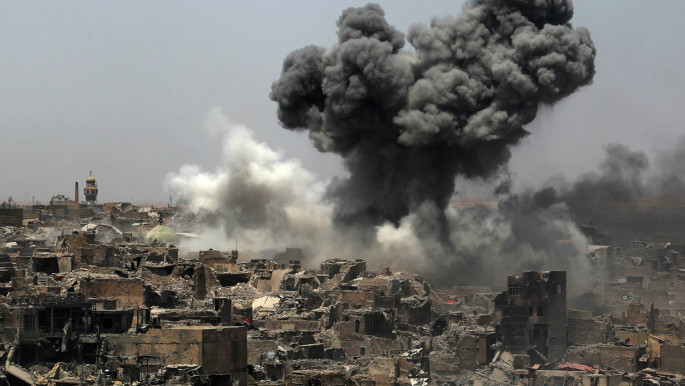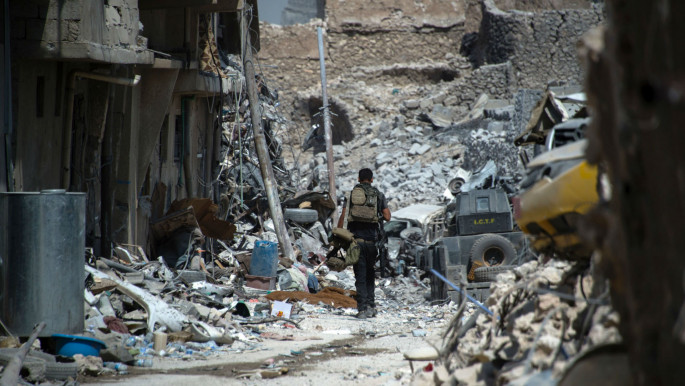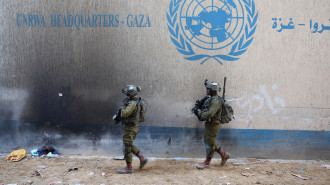The Iraq Report: Victory amid the rubble of Mosul
The Iraq Report is a new weekly feature at The New Arab.
Click here to receive The Iraq Report each week in your inbox
Iraqi Prime Minister Haider al-Abadi has, finally, after almost nine months of vicious combat, declared victory in Mosul. The last pockets of Islamic State group militants are being “mopped up”, though major combat operations have now ended. The sheer cost of the conflict has yet to be tallied, though early signs indicate that Abadi’s victory may yet be merely pyrrhic.
The fissures between the would-be allies against IS have already been appearing, as rival Kurds turn on each other, and fighting breaks out in government-controlled, UN-supported refugee camps -leading international aid organisations to temporarily suspend operations supporting the hundreds of thousands displaced by the fighting. Members of the US-led coalition against IS have also criticised the Mosul victory, leading to regional uncertainty for the future of Iraq after IS’ defeat in Mosul.
V-Day in Mosul
On Sunday, Prime Minister Abadi arrived in Mosul to announce victory over IS, and was photographed and filmed sitting in the headquarters of the Iraqi Federal Police, issuing orders for the final eradication of IS militants in the Old City.
By Monday, the prime minister had formally declared victory and hailed Iraq’s “heroic fighting forces” who have been battling for the better part of a year in the ravaged city. As Abadi was making his announcement, soldiers were seen still shooting from atop ruined buildings, and airstrikes continued to kick up plumes of smoke, dust and debris.
Iraqis had mixed feelings about the final victory announcement, with some celebrating and some lamenting the sheer devastation wrought upon the ancient city. Kadim al-Sahir, music superstar, thanked the Iraqi security forces for “liberating…our beautiful Mosul”. Sahir, who has not lived in Iraq for decades, was criticised by some Iraqi social media users on Twitter with sarcastic remarks such as: “Looking forward to [Mosul’s] liberation from the Iranians.”
Iraqi politicians such as the Sunni secretary-general of the Iraqi Islamic Party,Iyad al-Samarrai, congratulated the people of Mosul on the “historic victory”, and expressed hope that a new dawn had broken over the city and its people, leading to a renaissance in its fortunes. However, he was immediately blasted by members of the Iraqi opposition-in-exile, including journalist Mustafa Kamil: “Some of [Samarrai’s] people opposed our describing him as ‘vile’. After this, how else should we describe this vile man!?”.
The differences appear to be between those who support the military operation as it was carried out, and those who preferred a strategy whereby local Iraqis – particularly Sunni Arabs – should have been empowered in order to fight IS to liberate their own city. Many Iraqis still blame the central government for sectarian policies that led to the rise of IS in the first place, and believe that this could have been avoided had Baghdad treated all its citizens equally within a democratic framework.
 |
| Iraqi forces celebrated their victory in Mosul three years after IS took control [Getty] |
Mosul left in ruins
The Mosul operation, dubbed “We are coming, Nineveh” – named for the governorate of which Mosul is capital– began on 16 October last year. Eight months, three weeks and three days of gruelling fighting has left severe infrastructural damage, crippled government forces and a humanitarian disaster.
Drone footage from Mosul shows a city devastated. Mosque domes have been caved in by mortar shells, their walls pock-marked by heavy gunfire, and rows upon rows of residences levelled. Although Abadi has announced that the people of Mosul “can now return to their homes”, this appears to be little more than political point-scoring, as even the more fortunate residents have shattered homes consisting of dangerous superstructures at risk of collapse.
A UK-based former resident of Mosul tweeted that his family went back to their home only to find it occupied by Iraqi army units who told them: “We rescued you, it’s ours now.” According to the same source, the family home had been looted, with even the furniture gone. Such reports are nothing new, as soldiers and Shia Islamist militants from the Popular Mobilisation Forces (PMF), or Hashd al-Sha’abiin Arabic, were photographed several times leaving Fallujah, Tikrit and other predominantly Sunni Arab towns with loot in tow.
Mosul’s symbolic Grand Nuri Mosque, built almost a millennium ago, was almost totally destroyed in the final two weeks of major combat operations. While the Iraqi government and the United States blame IS, the extremist group has denied responsibility. Iraqi intellectuals and political figures have also publicly rubbished Baghdad’s claims, and alleged that the government and the US-led coalition were instead responsible.
Turkish President RecepTayyip Erdogan has simultaneously hailed and slammed the Mosul operation, saying that he was “very happy” that the operation had ended, but “we have now been left with a Mosul in ruins…Who will meet the cost of rebuilding Mosul for the people of Mosul?”. Early estimates suggest that Mosul’s city infrastructure alone may cost around $1 billion to rebuild, with a corrupt and cash-strapped Baghdad unlikely to foot the bill.
 |
| Iraq's second city was left in ruins after months of battle to push out IS [Getty] |
Iraqi security forces decimated
Iraq has not yet released full casualty figures for the Mosul operation, and has been very tight-lipped about its losses since the start of fighting. However, reports throughout the battle showed that IS had consistently inflicted crippling losses, numbers that may have been inadvertently confirmed by the United Nations, who stopped reporting fatality figures less than two months into the operation following a protest by Abadi’s government.
During at least the first half of the battle, The Islamic State group’s Amaqpropaganda news agency provided regular, almost weekly updates to their operations, with monthly round-ups. By February, almost four months into the fighting, reports began to emerge, collating fatality announcements that showed close to 7,000 Iraqi soldiers killed during the fighting.
By April, Al Jazeerahad confirmed these figures, and reported that 8,000 soldiers had been killed, according to Iraqi security sources. This figure did not include PMF militiamen, but only Iraqi army and Federal Police units - themselves heavily staffed by the pro-Tehran Shia Islamists from the Badr Organisation that controls the interior ministry.
On Monday, The New Arab reported that a US Defense Department budget document showed that Iraq’s elite and US-trained Counter Terrorism Service had suffered combat losses of at least 40 percent. These figures appear to tally with a report by Politico’s Mark Perry, who wrote in December that senior US CENTCOM military officials believed that elite CTS battalions had suffered “upwards of 50 percent casualties”.
From a security perspective, the decimation of an almost 100,000-man strong force versus 4,000-6,000 IS extremists could have a resounding impact not only on Iraqi security capabilities, but also Iraq’s state and society as a whole. With the gradual degradation and attrition of the army and police, the PMF – also officially recognised as a component of the Iraqi armed forces – could be called upon to fill in the security gap, and become a parallel army much like its benefactors, Iran’s Islamic Revolutionary Guard Corps (IRGC).
 |
| Thousands of Iraqis volunteered to join the fight against IS [Getty] |
Avoiding IS 2.0
The United States’ most senior commander in Iraq has also warned that the war against IS is far from over.
Speaking to the BBC, Lieutenant General Stephen Townsend said Baghdad authorities would have to mend ties with the Sunni Arab population if it wanted to avoid a resurgent IS or IS-style group.
“If we’re to keep…ISIS 2.0 from emerging, the Iraqi government is going to have to do something pretty significantly different,” Townsend said, suggesting that the Iraqi government’s previous policies that marginalised and discriminated against the Sunni Arabs could not return. The US general continued: “They’re going to have to reach out and reconcile with the Sunni population, and make them feel like their government in Baghdad represents them.”
However, experts have warned since the start of the Mosul operation of the threat of atrocities inflicted upon a civilian population leading to radicalisation, extremism and providing an incubating ground for extremist organisations like IS to thrive.
Throughout the fighting, Iraqi forces and allied Shia Islamist armed groups have been documented by Amnesty International, Human Rights Watch, the United Nations and many media organisations as having committed grave human rights abuses and atrocities against Mosul’s predominantly Sunni Arabs.
In May, media outlets including The New Arab and Der Spiegel reported looting, torture, rape and murder being pervasive throughout the operation. Sectarian violence and openly anti-Sunni actions have led to a perception among many that the recapture of Mosul was not a liberation, but in fact a return to the discriminatory subjugation Mosul’s denizens experienced in their city before IS took over in June 2014.
With Mosul’s people dehumanised in the eyes of the military “liberating” them, and atrocities continuing with complete impunity and a lack of accountability, there are now very real fears that IS 2.0 may very well become a reality.
Click here to receive The Iraq Report each week in your inbox

![Palestinians mourned the victims of an Israeli strike on Deir al-Balah [Getty]](/sites/default/files/styles/image_684x385/public/2024-11/GettyImages-2182362043.jpg?h=199d8c1f&itok=xSHZFbmc)


![The law could be enforced against teachers without prior notice [Getty]](/sites/default/files/styles/image_684x385/public/2178740715.jpeg?h=a5f2f23a&itok=hnqrCS4x)
 Follow the Middle East's top stories in English at The New Arab on Google News
Follow the Middle East's top stories in English at The New Arab on Google News


